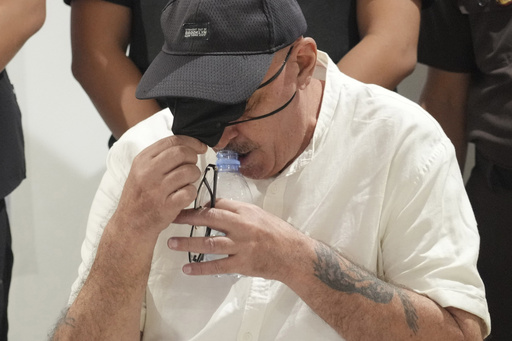
JAKARTA, Indonesia — On Tuesday, Indonesian officials facilitated the departure of a sick French citizen from a Jakarta prison as his process of returning to France commenced, following a bilateral agreement between the two nations.
Serge Atlaoui has been incarcerated in Indonesia for nearly two decades due to drug-related charges. In 2015, he narrowly escaped execution by a firing squad, thanks to heightened diplomatic negotiations from the French government, which argued that Atlaoui had an active legal appeal.
While Indonesia executed eight convicts in May 2015, Atlaoui’s execution was postponed. Following the denial of his final appeal by an Administrative Court in Jakarta in June, he continued to seek a resolution. At 61 and reportedly suffering from cancer, he reached out to the Indonesian authorities in December, requesting to complete his sentence in France.
In response, a transfer agreement was established and signed on January 24 by Indonesia’s senior minister of law, Yusril Ihza Mahendra, alongside France’s Minister of Justice, Gérald Darmanin, paving the way for Atlaoui’s return on Tuesday.
Arrested in 2005, Atlaoui was linked to a facility on the outskirts of Jakarta suspected of producing MDMA, commonly referred to as ecstasy. His legal team contends he was merely a welder in the factory, unaware of the illicit activities occurring within.
Originally from Metz, France, Atlaoui has continuously proclaimed his innocence throughout his two-decade imprisonment. He asserts that he was installing equipment in what he believed to be an acrylics manufacturing site, while law enforcement characterized him as a “chemist.” Initially sentenced to life in prison, his punishment was escalated to death by the Supreme Court in 2007 upon appeal.
On Tuesday afternoon, Atlaoui was escorted from Salemba Prison to the airport, where he was expected to board a flight to Paris later that day, with an estimated arrival time in France on Wednesday morning. He refrained from speaking to the media as he left the prison premises.
Upon his return to France, Atlaoui will serve the remainder of his sentence according to French legislation, according to I Nyoman Gede Surya Mataram, an official in the immigration and corrections sector. He emphasized that Indonesia remains committed to combating drug-related crimes within its borders.
Clad in jeans and a white shirt, with a baseball cap and mask, Atlaoui briefly faced reporters at the airport but chose not to comment.
French Ambassador Fabien Penone expressed gratitude towards Indonesian President Prabowo Subianto and his administration for facilitating the transfer. When questioned about Atlaoui’s future in France, Penone indicated that French authorities would re-evaluate his case.
Currently, around 530 individuals are on death row in Indonesia, primarily for drug offenses, including nearly 100 who are foreign nationals, as per data from the Ministry of Immigration and Corrections. Indonesia’s last executions occurred in July 2016 when an Indonesian citizen and three foreigners were executed.
In a related context, Indonesia returned Mary Jane Veloso, a Filipina woman who had been on death row, to her country in December after persistent petitions from the Philippines. Additionally, in the same month, five Australians, who faced lengthy incarceration for heroin trafficking, returned home under an arrangement facilitated by their governments.
As the recent repatriation of foreign prisoners has occurred, Jakarta is contemplating potential legislation aimed at establishing new protocols for prisoner amnesty and transfers, part of a broader initiative to alleviate overcrowding in the nation’s prison system.

